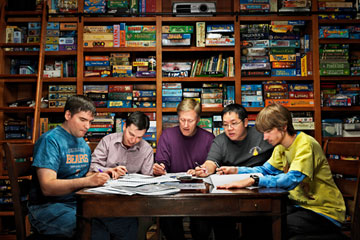
Kraljevica is a tiny Croatian shipbuilding hamlet on the eastern edge of the Adriatic Sea. If you've heard of it--which you almost certainly haven't--it's probably because its shipyard, which had been in continuous operation since 1729, went bankrupt last June, a casualty of the pan-European financial crisis. Kraljevica (pronounced Krall-yay-vi-tsa) sits on a shatteringly beautiful, eerily calm bay, across from the stark and cruelly vowelless island of Krk.
The views are spectacular. But for three clear, sunny days in October they went unappreciated, because Kraljevica was hosting the World Puzzle Championship. Not only was nobody outside, nobody was even looking out a window.
You probably haven't heard of the World Puzzle Championship either, but you should have, because it's the most extreme test of pure logical-reasoning power on the planet. It has taken place annually for the past 21 years; in 2012 it drew 145 contestants from 26 countries, many of them people who eat, breathe and, on the rare occasions when they sleep, dream about puzzles full time.
These guys are outliers, honest-to-God geniuses. But they're just the most illustrious representatives--the apex predators--of a vast, worldwide puzzling population that numbers in the hundreds of millions. Puzzles have always been a ubiquitous but unassuming and peripheral presence in our lives, folded meekly into the back pages of magazines and newspapers. But with the rise of the Internet and mobile devices, they've moved closer to center stage and become a not insignificant part of global culture, almost as pervasive, in terms of their reach and the number of person-hours they consume, as television and movies. No one knows exactly how many Americans do puzzles, but everyone agrees that the number of crossword puzzlers runs into the tens of millions. Estimates for the number of sudoku players run up to 80 million worldwide. And that's to say nothing of puzzlish and puzzlesque activities like Scrabble, Words with Friends, bridge, Tetris, Rubik's Cubes (over 300 million sold) and Angry Birds (260 million users at last count). Now that puzzles have escaped from newspapers and migrated onto our phones and tablets, no idle moment is safe from them.
At the elite level, puzzle solving is in no way a casual activity. It's as intense and arcane and competitive as chess, in some ways more so. But events like the World Puzzle Championship, or WPC, tell us a lot about why ordinary people solve puzzles, and always have, and probably always will.
Completely in Control
The reasons aren't self-evident. You'd think we have enough problems in our lives without making up more of them. Puzzles demand concentration and intellectual effort, to the point where they resemble work more closely than they do play--the main difference being that at least with work you tend to get paid for your trouble. So why bother?
